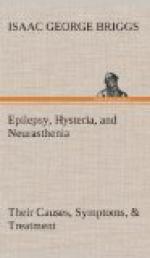In spite of rabid veget- and other “arians”, most foods are good (making allowances for personal idiosyncrasy) if thoroughly masticated. The oft-quoted analogy of the cow is incorrect, for herbivora are able to digest cellulose; but even cows masticate most laboriously.
Meat juices are the most digestion-compelling substances in existence, and a little meat soup, “Oxo” or “Bovril” is an excellent first course.
No one needs more than three meals per day, while millions thrive on one or two only, which should be ready at fixed hours; for the stomach when habituated becomes congested and secretes gastric juice at those hours without the impulse of the will, is ready to digest food, and gets that rest between-times which is essential to sound digestion. The man who has snacks between meals, and chocolates and biscuits between snacks can never hope to get well.
To eat the largest meal at midday, as is the custom of working-men, is best, provided one can take half an hour’s rest afterwards.
Drink a pint of tepid water half an hour before every meal. If the stomach be very foul, add a teaspoonful of bicarbonate of soda to the water.
The question of alcohol is a vexed one, but Paul’s “Take a little wine for thy stomach’s sake,” is undoubtedly sound advice, though had Paul been trained at a London hospital, he would have added “after meals”. Unfortunately, moderation is usually beyond the ability of the neuropath, and consequently he should be forbidden to take alcohol at all. Spirits must be avoided.
Moderately strong, freshly made tea or coffee may be consumed in reasonable quantity.
Vegetable salads are excellent if compounded with liquids other than vinegar or salad oil, and of ingredients other than cucumbers, radishes, and the like.
Take little starchy food and sweetmeats. It may surprise those with “a sweet tooth” to learn that, to the end of the Middle Ages, sugar was used only as a medicine. Meat must be eaten—if at all—in the very strictest moderation, and never more than once a day. Eggs, fish and poultry—in moderation too—take its place.
Healthy children need very little meat, while it is a moot point if children of unstable, nervous build need any at all. The diet at homes for epileptics is usually vegetarian, and gives excellent results.
Never swallow skin, core, seeds or kernels of fruits, many of which, excellent otherwise, are forbidden because of the irritation caused to stomach and bowels by their seeds or skins.
Bromides are said to give better results if salt is not taken. A little may be used in cooking, if, as is usually the case, the patient has to eat at the common table, but condiments are unnecessary and often irritating to delicate stomachs.
The diet of nervous dyspeptics must be very simple, and though it is trying and monotonous to forgo harmful dainties in favour of wholesome dishes, it is but one of the many limitations Nature inflicts on neuropaths. Many an epileptic, after believing himself cured, has brought on a severe attack by an imprudent meal. La Rochefoucauld says: “Preserving the health by too strict a regimen is a wearisome malady”, but it is open to all men to choose whether they will endure the remedy or the disease.




